Indicators Suggest Some Caution Still Warranted
Please accept my apologies for the tardiness of this week's report. We had traveled to Chicagoland for family gatherings over the weekend and I awoke Monday morning to no internet where we were staying. And while the trek home was an adventure thanks to Mother Nature, all is right with my world from a technology standpoint this morning.
While our thoughts and prayers remain with the folks in Houston this morning, geopolitical tensions have returned to the center stage. With North Korea's boy-leader firing a missile over Japan last night, the concern is that retaliatory measures could be taken and the situation could easily escalate. Where this goes is anybody's guess, but as far as the market is concerned, it appears that traders are taking a defensive stance in the early going today.
But before we get carried away with speculation, let's turn our attention to our objective review the key market models and indicators and see where things stand. To review, the primary goal of this weekly exercise is to remove any subjective notions one might have in an effort to stay in line with what "is" happening in the markets. So, let's get started.
The State of the Trend
We start each week with a look at the "state of the trend." These indicators are designed to give us a feel for the overall health of the current short- and intermediate-term trend models.
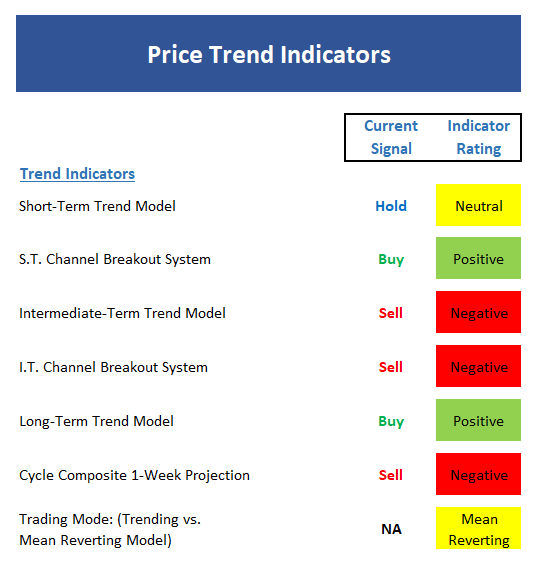
View Trend Indicator Board Online
Executive Summary:
- The short-term Trend Model is currently neutral, due at least in part to the recent sideways action.
- The short-term Channel Breakout System is currently positive but a break below 2417 would flip it back to negative.
- The intermediate-term Trend Model has improved but remains negative.
- The intermediate-term Channel Breakout System will require a move to new highs in order for the signal to go back to positive.
- The long-term Trend Model remains in pretty good shape.
- The Cycle Composite continues to point lower with only intermittent rallies through the middle of October.
- The Trading Mode models agree that stocks are back in a mean-reverting environment.
The State of Internal Momentum
Next up are the momentum indicators, which are designed to tell us whether there is any "oomph" behind the current trend...
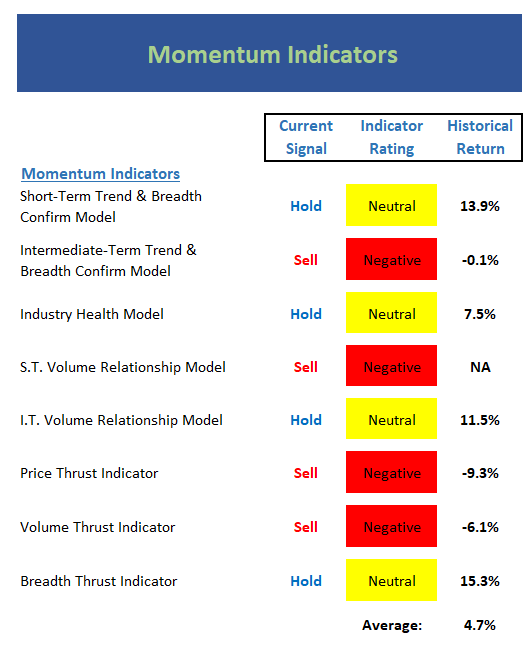
View Momentum Indicator Board Online
Executive Summary:
- The short-term Trend and Breadth Confirm Model has improved to neutral but it won't take much for this model to return to negative.
- Our intermediate-term Trend and Breadth Confirm Model remains negative.
- The Industry Health Model is still stuck in the neutral zone. I continue to see this as a problem.
- Despite the bounce off the recent lows, the short-term Volume Relationship has continued to weaken as the up volume line is now at the lows of the year.
- The intermediate-term Volume Relationship model is moving in the wrong direction.
- The Price Thrust Indicator, which requires some "oomph" in order to move, didn't budge during the recent rebound.
- The Volume Thrust Indicator is negative.
- The Breadth Thrust Indicator has upticked to neutral.
The State of the "Trade"
We also focus each week on the "early warning" board, which is designed to indicate when traders may start to "go the other way" -- for a trade.
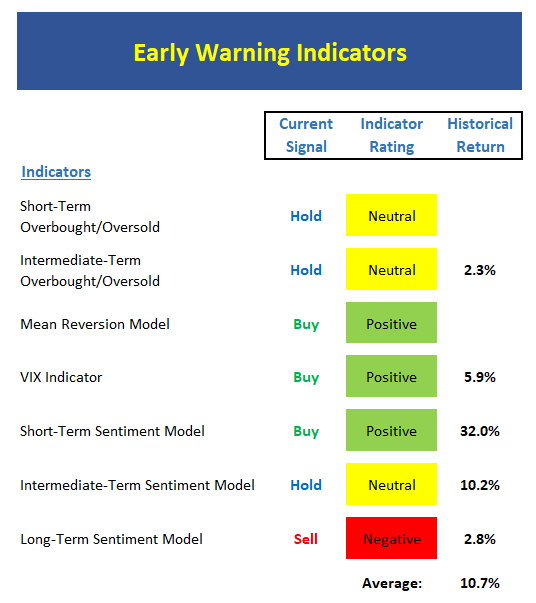
View Early Warning Indicator Board Online
Executive Summary:
- From a near-term perspective, the recent oversold condition has been worked off. Thus, this mean-reversion tailwind is now still.
- From an intermediate-term view, stocks remain in never-never land.
- The Mean Reversion Model is still on a buy signal. However, the model is weakening quickly and the most recent signal looks to have been false.
- The VIX Indicator is technically on a buy signal at the moment. However, the return of tensions in N. Korea could change this quickly.
- From a short-term perspective, market sentiment is now negative, which, is a positive.
- The intermediate-term Sentiment Model has returned to neutral.
- Longer-term Sentiment readings continue to be a negative input.
The State of the Macro Picture
Now let's move on to the market's "external factors" - the indicators designed to tell us the state of the big-picture market drivers including monetary conditions, the economy, inflation, and valuations.
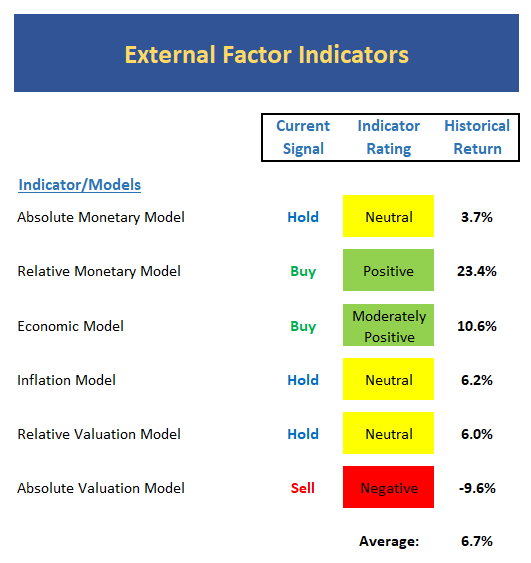
View External Factors Indicator Board Online
Executive Summary:
- Absolute Monetary conditions slipped back to neutral last week.
- The Relative Monetary Model continues to improve and is currently at the highest level seen since last summer.
- Our Economic Model (designed to call the stock market) remains on a buy signal but weakened a fair amount last week.
- The Inflation Model continues to suggest that inflationary pressures are receding.
- Our Relative Valuation Model continues to improve, but remains in neutral at this time.
- The Absolute Valuation Model remains resolutely negative.
The State of the Big-Picture Market Models
Finally, let's review our favorite big-picture market models, which are designed to tell us which team is in control of the prevailing major trend.
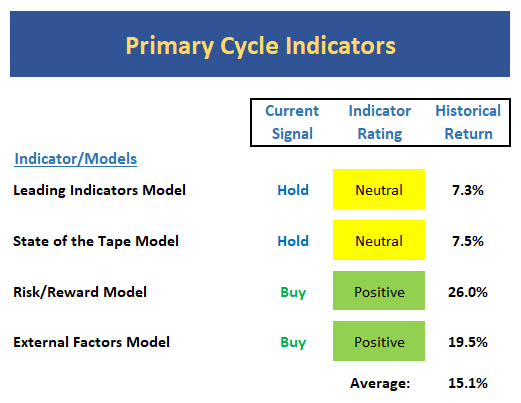
View My Favorite Market Models Online
Executive Summary:
- The Leading Indicators model took a dive last week and is now only slightly above negative. This is something to watch closely.
- The Tape continues to be less than robust, which in my book, suggests risks are elevated.
- The Risk/Reward model peeked its head into positive territory and remains there this week.
- The External Factors model also improved enough recently to turn the box green. From a long-term perspective, this suggests that the secular bull is intact and dips should be bought.
The Takeaway...
My key takeaway this week is that from a big-picture standpoint, not much has really changed. Although some of my models have improved, the lack of green on the momentum board is very telling. And given the combination of negative seasonality and renewed geopolitical issues, I would not be surprised to see stocks test their recent lows in the near-term. The question of the day then is, do the bears have enough working for them to get something meaningful going?
Thought For The Day:
Life is 10% what happens to you and 90% how you handle it. -Unknown
Current Market Drivers
We strive to identify the driving forces behind the market action on a daily basis. The thinking is that if we can both identify and understand why stocks are doing what they are doing on a short-term basis; we are not likely to be surprised/blind-sided by a big move. Listed below are what we believe to be the driving forces of the current market (Listed in order of importance).
1. The State of Geopolitics
2. The State of the Economic/Earnings Growth (Fast enough to justify valuations?)
3. The State of the Trump Administration
4. The State of Fed Policy
Wishing you green screens and all the best for a great day,

David D. Moenning
Chief Investment Officer
Sowell Management Services
Disclosure: At the time of publication, Mr. Moenning and/or Sowell Management Services held long positions in the following securities mentioned: none. Note that positions may change at any time.
Disclosures
The opinions and forecasts expressed herein are those of Mr. David Moenning and may not actually come to pass. Mr. Moenning's opinions and viewpoints regarding the future of the markets should not be construed as recommendations. The analysis and information in this report is for informational purposes only. No part of the material presented in this report is intended as an investment recommendation or investment advice. Neither the information nor any opinion expressed constitutes a solicitation to purchase or sell securities or any investment program.
Any investment decisions must in all cases be made by the reader or by his or her investment adviser. Do NOT ever purchase any security without doing sufficient research. There is no guarantee that the investment objectives outlined will actually come to pass. All opinions expressed herein are subject to change without notice. Neither the editor, employees, nor any of their affiliates shall have any liability for any loss sustained by anyone who has relied on the information provided.
The analysis provided is based on both technical and fundamental research and is provided "as is" without warranty of any kind, either expressed or implied. Although the information contained is derived from sources which are believed to be reliable, they cannot be guaranteed.
David D. Moenning is an investment adviser representative of Sowell Management Services, a registered investment advisor. For a complete description of investment risks, fees and services, review the firm brochure (ADV Part 2) which is available by contacting Sowell. Sowell is not registered as a broker-dealer.
Employees and affiliates of Sowell may at times have positions in the securities referred to and may make purchases or sales of these securities while publications are in circulation. Positions may change at any time.
Investments in equities carry an inherent element of risk including the potential for significant loss of principal. Past performance is not an indication of future results.
Advisory services are offered through Sowell Management Services.
